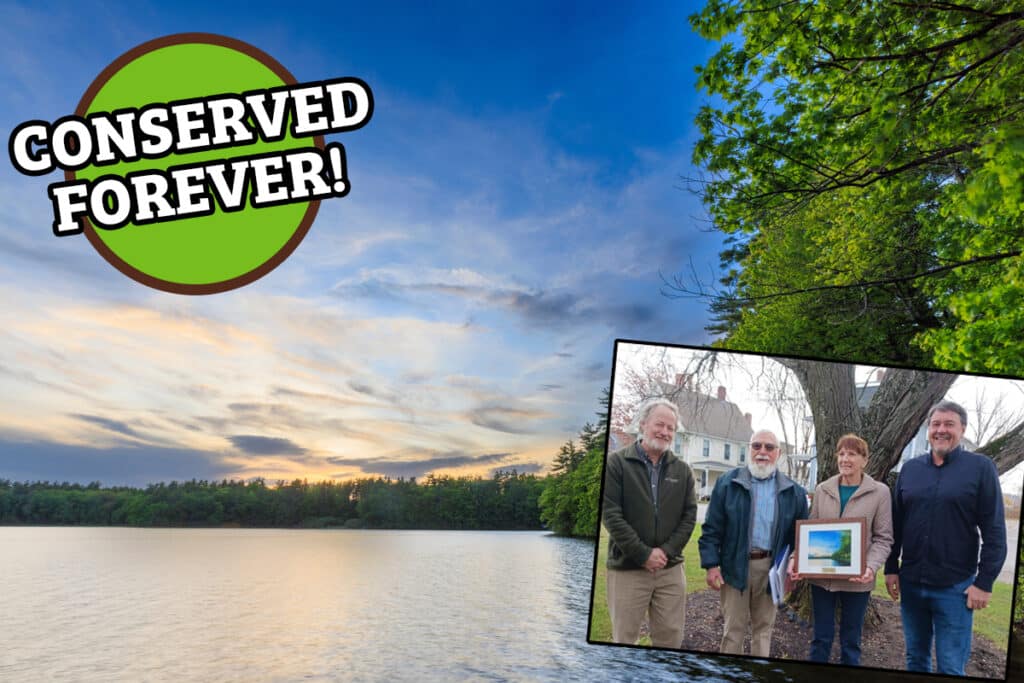
The Southeast Land Trust of NH (SELT) recently completed the acquisition of a conservation easement over the 163-acre Landry Forest located along Washington Street, Franklin Pierce Highway and the shores of Nippo Lake in Barrington, NH.
“The Landry property is a puzzle piece that builds the conservation bridge from SELT’s Leighton Forest to SELT’s Stonehouse Forest,” says Duane Hyde, SELT’s Land Conservation Director. “The property includes Mount Misery and is home to a rare forest system, several rare wetland systems, and vernal pools.”
This was a partnership project with the Nippo Lake Association along with other funding partners including the New Hampshire Land and Community Heritage Investment Program (LCHIP), NH Aquatic Resource Mitigation Fund, NH State Conservation Committee Conservation Mooseplate Grant Program, EPA 319 Program, the Town of Barrington, and many generous individual donors.
“This is a land that is very important to our family,” Jim says. “For the past fifty years, we’ve hiked and explored this place. My children played all around Mount Misery. I don’t think there are many properties like this, especially on a lake like this. That is why we wanted to conserve it.”
For the Nippo Lake Association, this was a critical project in their effort to avoid future cyanobacteria outbreaks on the lake. The Association was the first in the state to try an innovative lake treatment that thus far has proven successful. As such, watershed land conservation remains a high priority in their watershed management plan and this conservation easement alone protects 25% of the watershed and includes a half mile of frontage on Nippo Lake.
“In our childhood memories, this was a pristine little pond,” says Kevin Fitzgerald, a former Board member of the Nippo Lake Association, whose family has lived on the lake for over 50 years. “The Lake Association is dedicated to the single purpose of the stewardship, care, and protection of Nippo Lake and its watershed. We are hoping to reverse some of the effects of the development. Over the passing of time, Nippo Lake has taken a pounding from man and nature.”
“The Landry forest is a critical piece of the mosaic of wildlands in Barrington,” said Doug Bogen, Chair of the Barrington Conservation Commission. “It’s conservation protects much of the shore of the fragile Nippo Lake as well as historic and diverse open space in a relatively untouched portion of our town.”
As part of the conservation easement, SELT will be building a small parking area in 2025 so people can walk the woods road and enjoy views of the lake.
“A mountain top, undeveloped lake frontage and a deep history are all rolled up into this 163-acre conservation easement project in the seacoast region of New Hampshire. The Landry Nippo Lake property is a rare opportunity for the Southeast Land Trust of New Hampshire and the Nippo Lake Association to provide remote lake access for the public to enjoy,” said Paula Bellemore, Executive Director of the Land and Community Heritage Investment program. “LCHIP is pleased to have supported them in this effort.”
Photo Credit: Jerry Monkman – EcoPhotography
About SELT
SELT is a nonprofit land trust with a mission to protect and sustain the significant lands in our communities for clean water, fresh food, outdoor recreation, healthy forests, and wildlife. Since 1980, the Southeast Land Trust has worked in 52 communities of southeastern New Hampshire to conserve more than 25,000 acres of land through conservation agreements and ownerships. SELT is accredited by the Land Trust Accreditation Commission. For more information, visit seltnh.org.
About LCHIP
The New Hampshire Land and Community Heritage Investment Program (LCHIP) is an independent state authority providing matching grants to New Hampshire’s municipalities and non-profits, helping to preserve the state’s most important natural, cultural, and historic resources and ensure their contribution to the economy, environment, and quality of life in New Hampshire. Since 2000 LCHIP has awarded 564 grants, invested $58 million in 198 NH communities, conserving 237,000 acres of land, and rehabilitating 200 historic structures. Learn how LCHIP is helping to preserve and protect New Hampshire’s heritage at LCHIP.org, by following LCHIP_NH on Instagram, or Facebook.
